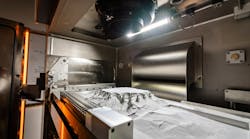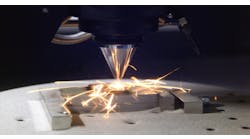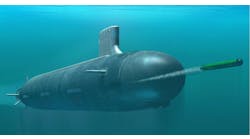The LIFT manufacturing research institute reported a new development under its sponsorship involving a method for producing customized powdered metal alloys. The research by undergraduate teams at Michigan Technology University reportedly will contribute to developing new materials and “road maps” for hypersonics applications.
LIFT is a public-private partnership of the U.S. Dept. of Defense and a range of industrial and academic interests, working to define manufacturing processes for lightweight materials. Michigan Tech is also working with LIFT in the ongoing Hypersonics Thermal Management and Material Acceleration programs, funded by DoD, to define roadmaps for developing alloys and processes for commercial, off-the-shelf materials that may be produced by additive manufacturing for hypersonics.
Hypersonic weapon systems operate at speeds of Mach 5 or higher but in low-Earth atmospheres. Developing such weapons, along with a domestic supply chain for them, are among DoD’s top priorities.
The new powder-metal production process was developed by four teams of Michigan Tech students and involves a 10-ft-tall modular chamber into which molten metal is poured through a funnel, and then atomized using a high-pressure gas nozzle. The powdered metal thereby created is collected from the bottom of the chamber.
The chamber is designed to atomize about 88 lbs. (40 kg) of metal, including ferrous metals, nickel-based alloys, and aluminum-based alloys.
Atomization is a standard production process for PM but the production capacity is limited for the types of alloys needed for advanced research programs, and Paul Sanders, a Michigan Tech professor of Materials Science and Engineering who served as faculty advisor to the four teams, said the teams’ work will promote development of new alloy metal powders.
“This atomization capability is needed because current powders for metal additive-development projects are expensive and have long lead-times,” according to Sanders. “This chamber, if built and deployed, will provide for improved powder additive alloy design faster and at less cost across industry.”
LIFT’s chief technology officer Noel Mack said currently available quantities for custom PM alloys are either too small or too large for effective research. “The possibility of creating customer powders in specific amounts could speed up our innovation processes of future applications, such as materials for hypersonics, and therefore speed up the adoption by industry,” Mack said.
Michigan Tech is also partnered with LIFT in the ongoing Hypersonics Thermal Management and Material Acceleration programs, both funded via the Dept. of Defense, to develop roadmaps for alloy and process development for off-the-shelf materials for additively manufactured parts, for use in hypersonic applications.






